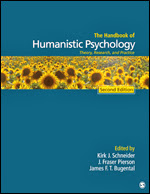EHI and The Handbook of Humanistic Psychology - EHI Contributor Profiles
This blog series highlights an EHI faculty member and/or an EHI affiliated contributing author to The Handbook of Humanistic Psychology. This week's post features Nader Shabahangi and his chapter on Humanistic Elder Care.Why Humanistic Eldercare? Read this excerpt from Nader's contributed piece to get a preview of Ch.16 Humanistic Eldercare: Toward a New Conceptual Framework for Aging.
"The present conceptual framework used in the way we look at aging and the way we care for our elders is demeaning and harmful to our elders and to the well-being of our societies at large. Yet, from large to small eldercare corporations and businesses, this outdated framework and understanding continues to disgrace and devalue our elders. In contrast to this outdated and harmful attitude stands an existential-humanistic, process-oriented approach. Such an attitude regards aging and old age as purposeful. It understands caring – whether it is receiving or giving care – as essential to our humanity; and it regards the many symptoms of aging and old age as meaningful guideposts to be understood rather than made into problems and/or pathologies.
This attitude opposes the present mainstream idea of aging, old age and care for elders where aging is understood as a disease, old age as a phase to be avoided and basically useless, and the many symptoms associated with aging and old age as meaningless problems in need of treatments and cures. Even recently added concepts such as successful and healthy aging use longevity and physical health as basic measures of what are deemed successful and healthy. These concepts of aging and care are most often based on biologically quantitative and normative measures of human life. This means that measurements and standards to which those measurements are compared form the basis of evaluating a human being’s life, that is whether a person, for example, is performing, declining, successful, smart, healthy, or diseased."
What is Humanism in Elder Care? Watch this video of Nader Shabahangi speaking with AgeSong Interns where he discusses "The New Theory of Eldercare" and the focuses, methods and practices of a humanistic eldercare community.
The New Theory of Eldercare with Nader Shabahangi Part 2
See both Part 1 & 2 of the New Theory of Eldercare here in the AgeSong Video Library >>
Nader R. Shabahangi, PhD, received his doctorate from Stanford University and is a licensed psychotherapist. His multicultural background has made him an advocate for different marginalized groups of society throughout his adult life.
In the 1980's he worked with abused children and teenagers and led anticipatory bereavement groups for Coming Home Hospice. In 1992 he founded the non-profit organization Pacific Institute with the purpose of training psychotherapists in a multicultural, humanistic approach to counseling and to provide affordable therapy services to the many diverse groups living in San Francisco. In 1994, noticing the often inhumane treatment of the elderly living in institutions, he started to develop an innovative Gerontological Wellness Program in order to provide emotional support and mental health care services for the elderly. In 1997, together with his two brothers, Nader opened a residential care home for the elderly in San Francisco called Hayes Valley Care, where he could along with the Pacific Institute Internship team implement the Gerontological Wellness Program.
View Nader's EHI Biography >>
See Nader's Work with AgeSong >>
View Nader's Work With Pacific Institute >>
Read Nader's Blog, Nader's Musings >>
Find Nader's Next Speaking Event here on the AgeSong Calendar >>



